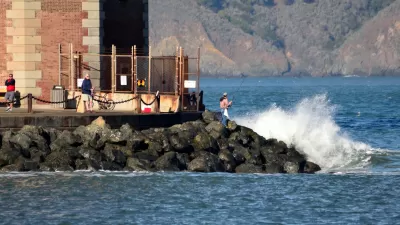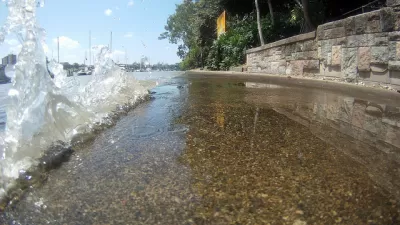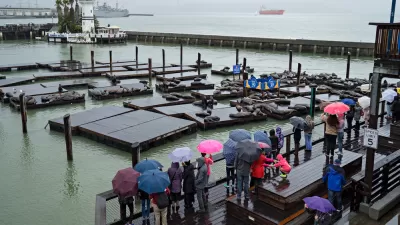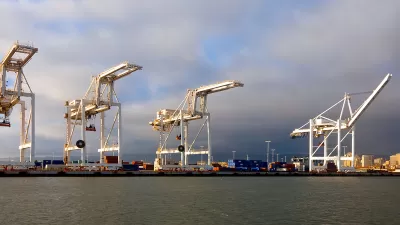The progressive city hopes to integrate economic, community, and climate resiliency measures in future projects.

The Planning Report looks at major resilience initiatives in San Francisco through an interview with City Administrator Naomi Kelly, beginning with upgrades to the century-old seawall that protects some of the city's most iconic—and most lucrative—destinations.
San Francisco was the first U.S. city to appoint a chief resilience officer through the 100 Resilient Cities program, and in that spirit, Kelly's approach incorporates the experiences of other places. For example, following the earthquake in Mexico City, where a school collapse killed more than 20 people, San Francisco has turned its attention to school buildings—specifically private schools, which were exempt from previous retrofit ordinances. And from Hurricane Katrina, Kelly says, SF learned about "the resilience of neighborhood networks."
"We realized that, after a major disaster, all of our public and private utilities need to be talking to one another. We set up a Lifeline Council, which meets regularly, made up of all the city agencies and private utilities—all the energy, gas, and telecom companies—so that we all know exactly who to call within those agencies when an emergency hits."
Other recent initiatives out of Kelly's office include the new Office of Cannabis, whose top priorities are equity—repairing damage done to communities of color by the War on Drugs—and sustainability. "We're working to develop sustainable solutions for an industry that is high-energy and water-intensive," Kelly explains. "For example, we want to mandate operators to provide the city with water management plans, descriptions of sustainability methods, and energy-efficiency reporting."
FULL STORY: SF City Administrator Naomi Kelly's Vision of a Resilient San Francisco

Alabama: Trump Terminates Settlements for Black Communities Harmed By Raw Sewage
Trump deemed the landmark civil rights agreement “illegal DEI and environmental justice policy.”

Study: Maui’s Plan to Convert Vacation Rentals to Long-Term Housing Could Cause Nearly $1 Billion Economic Loss
The plan would reduce visitor accommodation by 25% resulting in 1,900 jobs lost.

Planetizen Federal Action Tracker
A weekly monitor of how Trump’s orders and actions are impacting planners and planning in America.

Waymo Gets Permission to Map SF’s Market Street
If allowed to operate on the traffic-restricted street, Waymo’s autonomous taxis would have a leg up over ride-hailing competitors — and counter the city’s efforts to grow bike and pedestrian on the thoroughfare.

Parklet Symposium Highlights the Success of Shared Spaces
Parklets got a boost during the Covid-19 pandemic, when the concept was translated to outdoor dining programs that offered restaurants a lifeline during the shutdown.

Federal Homelessness Agency Places Entire Staff on Leave
The U.S. Interagency Council on Homelessness is the only federal agency dedicated to preventing and ending homelessness.
Urban Design for Planners 1: Software Tools
This six-course series explores essential urban design concepts using open source software and equips planners with the tools they need to participate fully in the urban design process.
Planning for Universal Design
Learn the tools for implementing Universal Design in planning regulations.
Caltrans
Smith Gee Studio
Institute for Housing and Urban Development Studies (IHS)
City of Grandview
Harvard GSD Executive Education
Toledo-Lucas County Plan Commissions
Salt Lake City
NYU Wagner Graduate School of Public Service





























